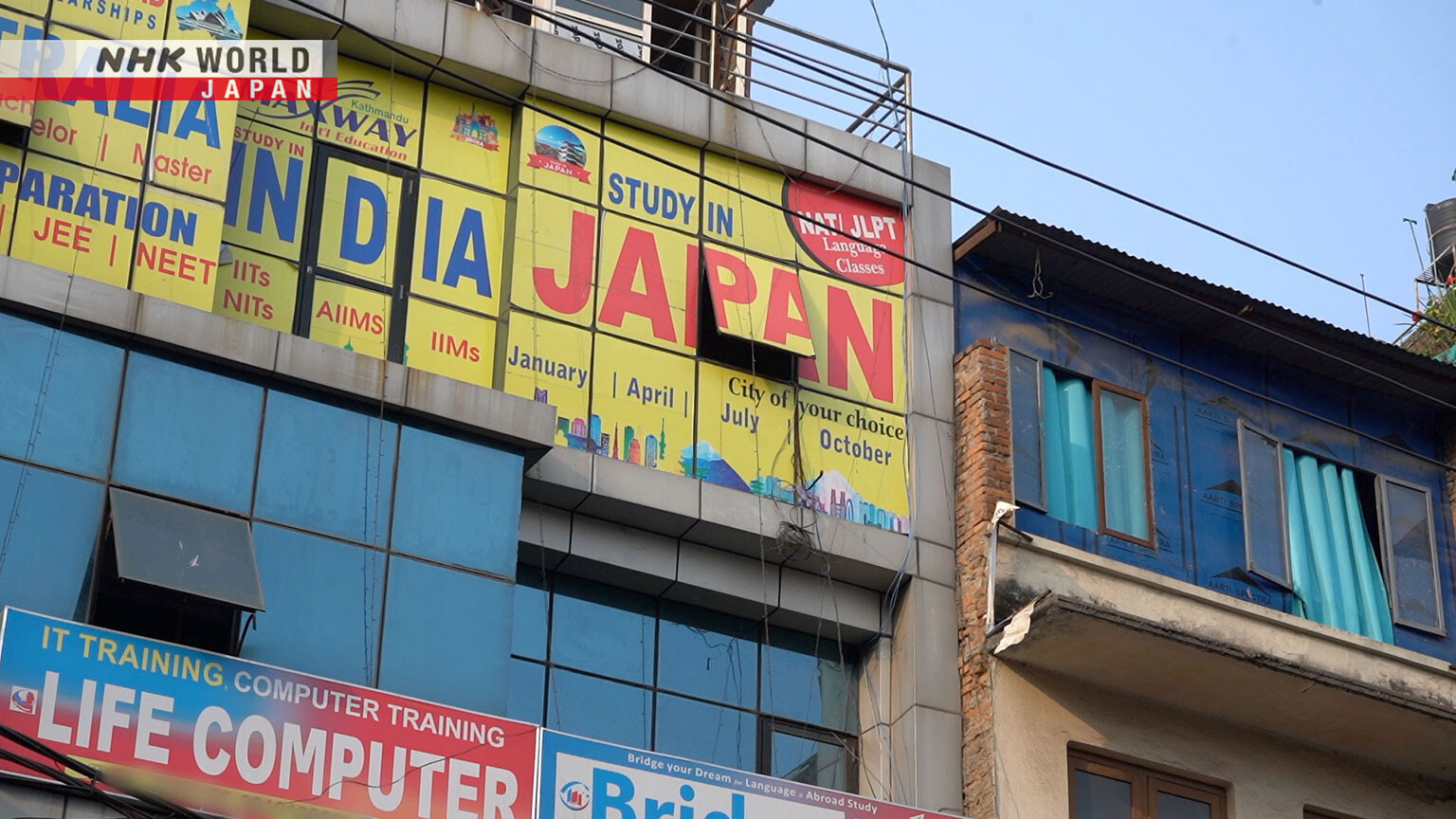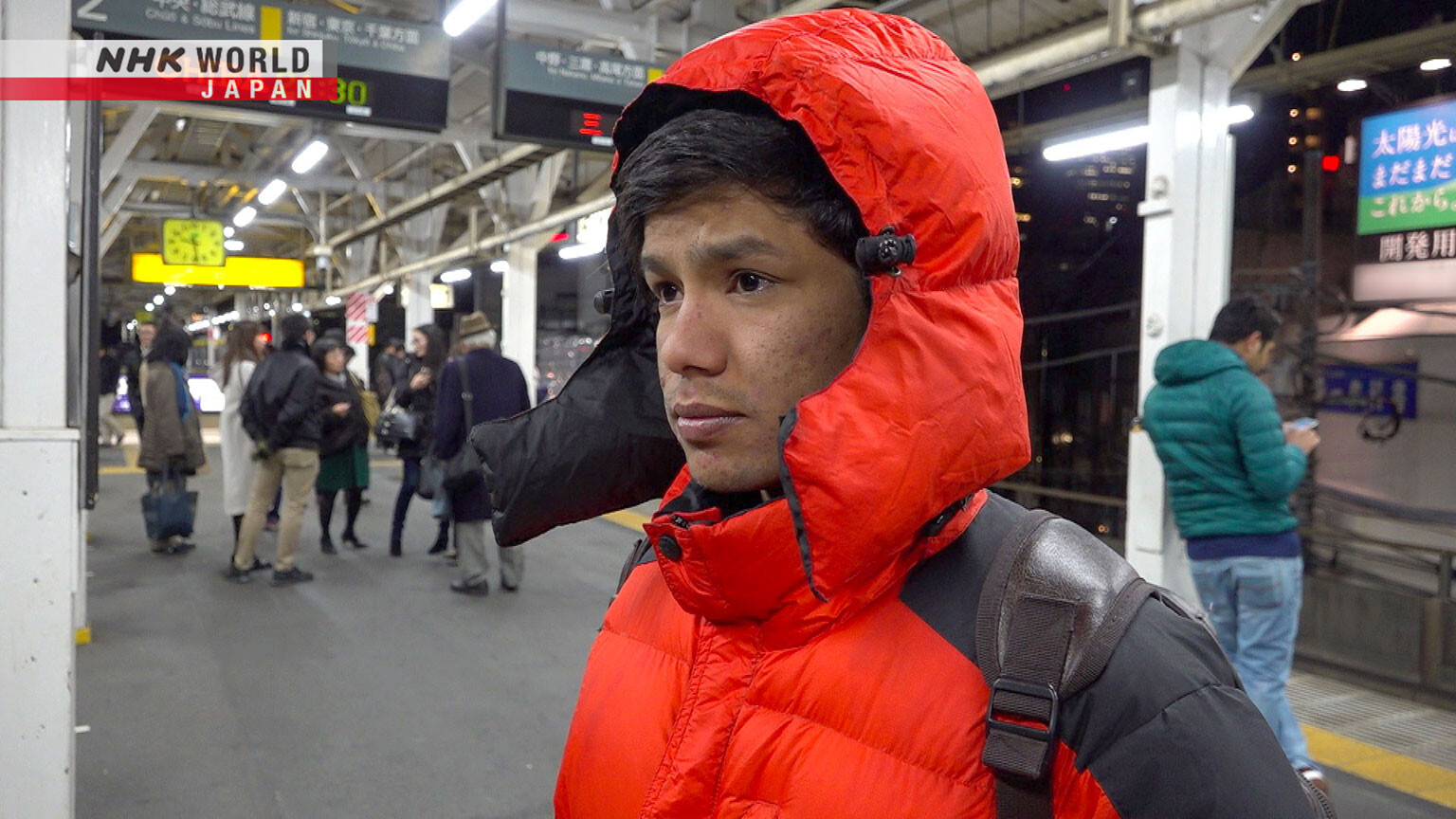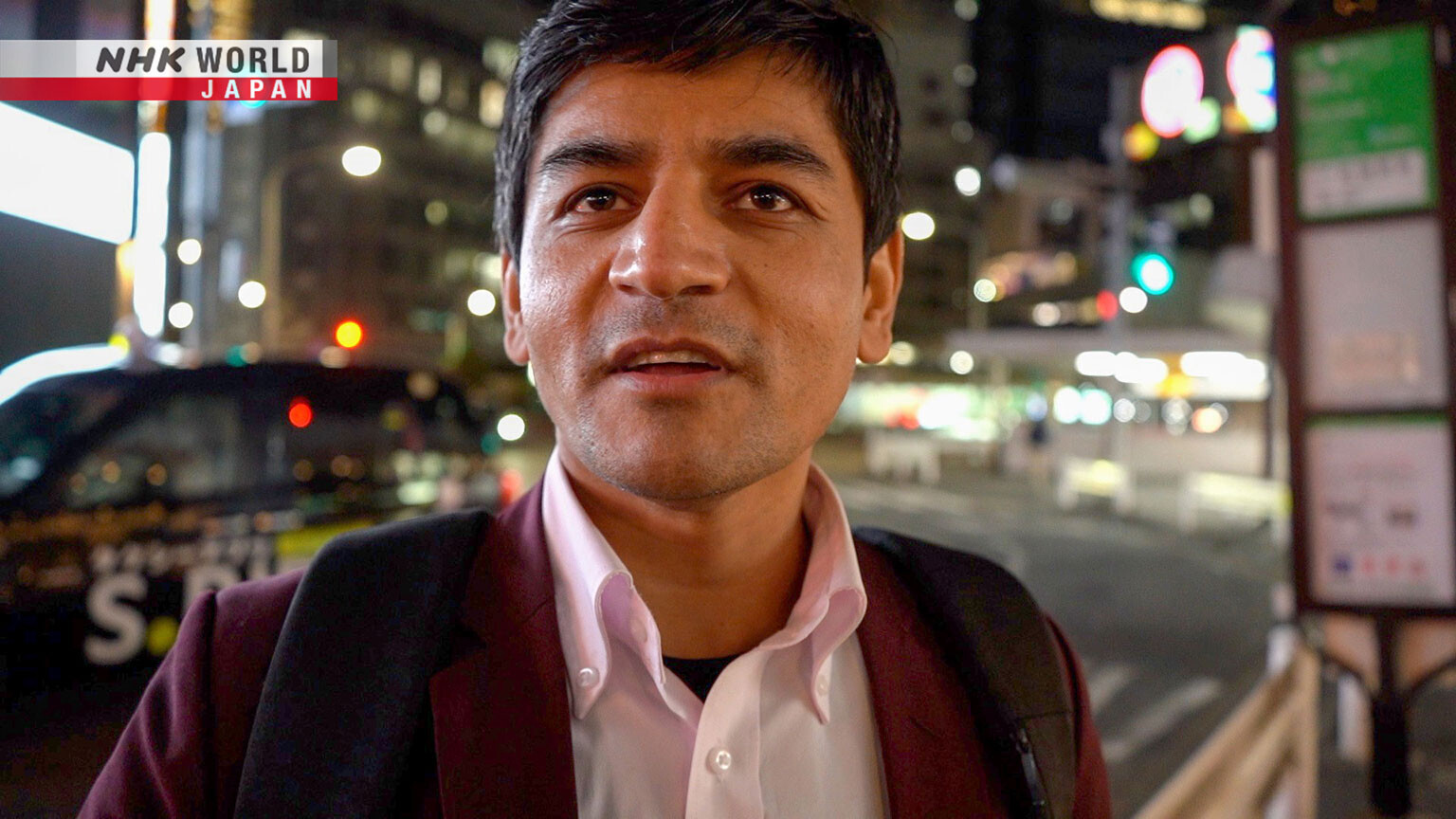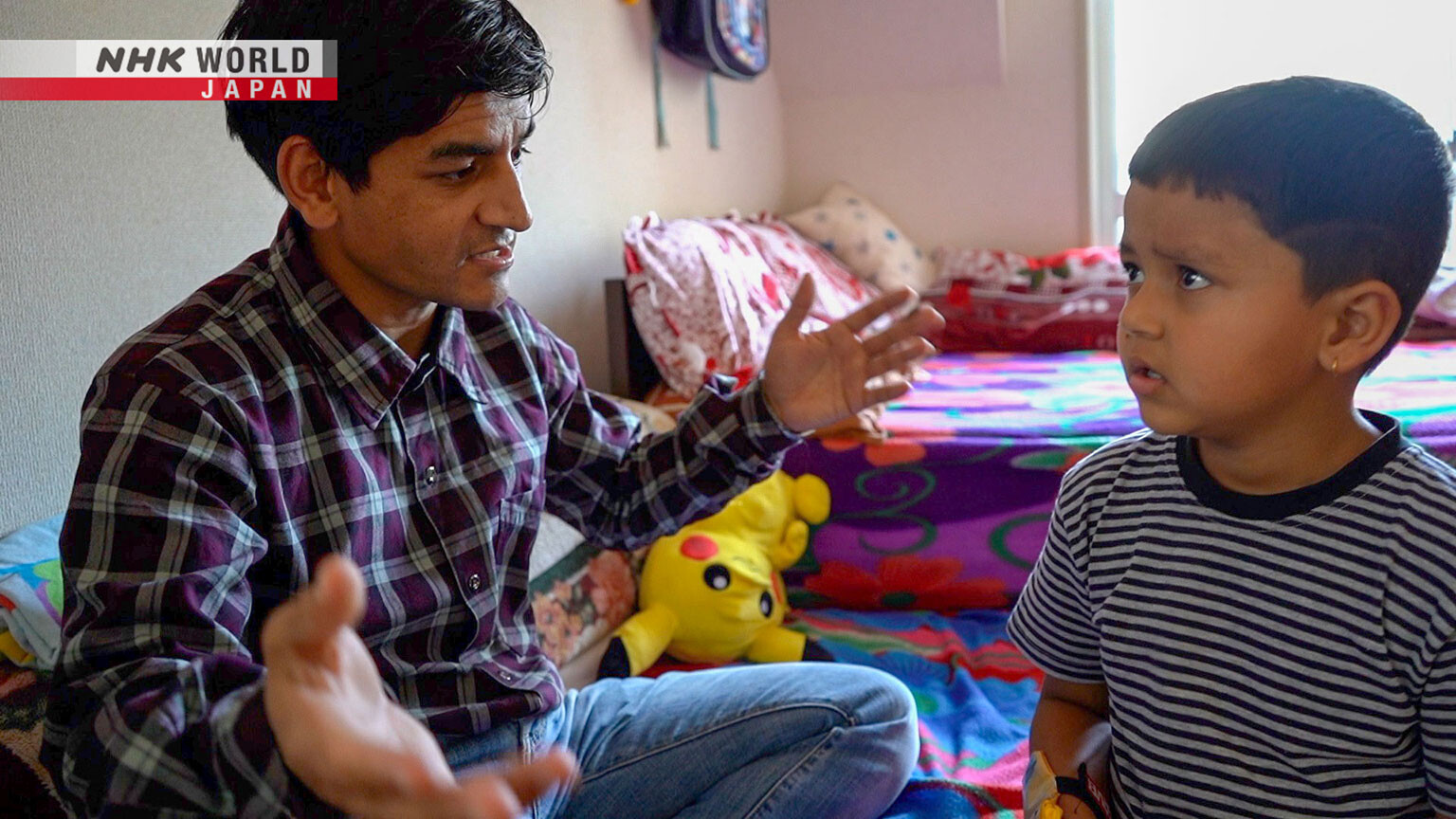An increasing number of Nepali youths are traveling to Japan to study, hoping to repay their migration debts and make lives for themselves, but they face the harsh realities of Japanese society.





Transcript
How many of these Kanji can you read?
I can read them.
So, how do you read this one?
"Mori."
And this one?
"Shinrin."
Right, meaning "forestry."
There are many chances for students in Japan.
Unlike in Nepal, you can find a job in your area of specialty.
What's your image of Japan?
Very developed, and people follow rules and regulations.
I think it's clean and peaceful.
After studying there, I want to find a good job, save money, and gradually achieve my dreams.
For over 15 years, I've researched Nepali migration to Japan,
conducting studies in both Japan and Nepal and documenting it in video.
In the last 10 years, the number of Nepali students in Japan has increased rapidly.
As of 2023, 45,000 Nepali students make up the second-largest group of foreign students in Japan.
Japan has lighter academic requirements than Western countries for gaining a student visa,
so many young people come to Kathmandu with an interest in Japan.
We have contracts with many Japanese schools.
This one is in Fukuoka.
This one is in Osaka.
We're connected to more than 100 schools.
We assign 400 to 500 students at a time, sometimes as many as 1,000.
Everyone, congratulations.
Your certificates of eligibility for study abroad have arrived.
You're 99% assured a visa now.
If you'd like to attend university in Japan, there are scholarships.
You might even get a $70,000 scholarship.
Are nose piercings allowed in Japan?
They aren't forbidden.
But it may depend on where you work.
Restaurants might have rules that don't allow them.
Now then, everyone stand, and bow!
Thank you!
Nepal's GDP per capita is around $1,300.
With a high unemployment rate of 12%, it seems to have been left behind Asia's wave of economic development.
Young people use study in Japan as a foothold to approach Japanese companies,
hoping to someday be granted permanent residency.
Lalkumari sees study in Japan as being the first step to her family immigrating there.
My income isn't stable here.
I make $140 a month when I'm busy.
If not, then it's half that.
How much do you expect to make in Japan?
Around $1,000 a month.
I think I'll use about $700 on living expenses and tuition, and save the rest.
It'll take me about $12,000 to get to Japan.
I should be able to get a loan for going overseas.
The annual interest will be 20%.
$12,000 pays for initial costs such as the visa application service, airfare, tuition, and boarding.
At an average salary in Nepal, it's about 6 years of earnings.
She'll be two years old in June.
Won't you miss your daughter?
More than words can express.
I'm going to Japan for her future, but I'll be worried for her while I'm away.
Once I graduate language school, I can change from a student visa to working visa, right?
Hopefully I can bring my husband, and with the increased income, our daughter too.
Look at Mom!
I began filming Nepali students in Japan from 2018.
They seek to gain a basic understanding of Japanese in language schools,
and then move on to technical schools or university.
One of them was Rajkumar, who had come from Nepal in 2017, and was attending a language school in Shin Okubo.
I'm embarrassed to show you my home.
Foreign students have trouble finding accommodations in Japan with good living conditions.
The four of them shared this apartment with total rent of $680 a month.
They'd initially lived in dorms provided by schools, but they moved here looking for lower rent.
In Nepal, there are no opportunities even for talented students to contribute to the country in high-tech fields.
I had been very frustrated, thinking that I had no future there.
That's why I wanted to go to Japan, where I could independently study and pursue a career.
Rajkumar aspired to graduate from a Japanese university and find work in the IT industry here.
After returning from school, they were asleep by evening.
Are you going to work? It's 9:00 PM.
I work from night to morning, with a one-hour break.
I stock products and man the register when there are customers.
I'm standing the whole time, so my feet get sore.
- You finished pretty late today?
- We're arguing with the owner a little.
It takes a lot of time to stock all the products neatly.
If I don't get them all on the shelf right, he'll be angry in the morning.
While doing their best to study, students often need to repay the migration loans they took out in Nepal.
Since their Japanese ability is still basic, they tend to find part-time work
doing things like packing meals or sorting packages that don't require conversation.
Most of them work from late night until morning.
Rajkumar took short naps after work and then headed to school again.
Did I forget anything?
15 minutes of sleep is something.
I sleep even when I have 20 minutes from noon.
I go to school rubbing my eyes.
Rajkumar was born and raised in a mountain village 200 km from Nepal's capital of Kathmandu.
While spending this year far from home, the beans his parents sent from his hometown were comfort food.
In Rajkumar's hometown, there's no work to be found outside of farming.
We hope our children will find their own way.
If they don't, their lives will be no better than ours.
When my son got his visa, I had to gather the money within 15 days.
I only had $18 on hand.
I spent 6 days borrowing $15,000 from all over the place.
I'd never even seen that much money before.
I told him that I borrowed the money.
I made it clear that I couldn't pay it back.
But he assured me that he'd repay it.
I couldn't imagine just how far away he was going.
Thinking about him getting by in a foreign country worried me.
I'm still worried.
I wonder if he's run into any trouble.
Is he eating well?
The part-time job Rajkumar first took after arriving in Japan
was far more difficult than his recent work at a convenience store.
I was sorting packages at a shipping company.
It was really hard having to move loads that weighed more than I did.
I couldn't tell my parents about it.
I didn't want them to feel bad for me.
I learned that in Japan, you sell your hours of sleep to buy your dreams.
I wrote a poem recently.
I'll read it to you.
I'm a man who loves his country, yet had to leave it behind.
When the airplane soared, I dreamed of soaring to the heights of education.
I dreamed of being a learned person who could do good for others.
I realized that I've only learned how to clean plates in a restaurant.
Tokyo is a lively city, full of joy and beauty.
But within this bustling city, I feel all alone.
It was around a decade ago that students from Nepal began to migrate to Japan in much greater numbers.
After the Great East Japan Earthquake of 2011,
numbers of students from countries like China and South Korea declined sharply.
Japanese language schools began reaching out to Nepal.
Young people traveled to Japan in pursuit of their dreams.
As the new source of labor posed an answer to Japan's graying workforce, their numbers grew.
"The mother cries as she works the fields."
"The son cries on the Japanese streets."
"The son toils in food packing and shipping."
Foreign students in Japan are permitted 28 hours per week of part-time work.
Under the pressure of their debts, some work beyond the limit and have their visas revoked.
How could people go home when they haven't graduated or repaid their debts?
This sort of situation is what drives students to suicide.
How does Japan expect us to get by?
One of Rajkumar's friends had been admitted to a university.
But on this day, his student visa renewal was refused.
Japan killed my dream.
You're not the only one who's gone through this.
Don't make me get up. I'm not moving.
With no dream left, I'll have to kill myself.
What choice do I have?
Don't you say that.
Even when students finish their education and find work, they face yet another harsh reality.
This is all part of the airport.
I work over there on the international flights.
But with the workforce lower due to the pandemic, I do domestic flights too.
Good morning.
Narayan came to Japan in 2017.
He was hired by a company that performs cabin cleaning of aircraft, changing his student visa to a working one.
Before the pandemic, the company hired more than 700 Nepali workers, of which Narayan served as a leader.
One night, I was told that the pilot of the plane I cleaned that morning was infected.
I cleaned all the seats for the 26 passengers who contracted COVID.
I can't tell you how terrified I was.
Narayan graduated from a university in Nepal before enrolling in a Japanese language school.
His wife, who he met at university, came to Japan with him on a student visa.
When we filmed this, she was about to give birth to their child.
Look at my shifts.
I have to manage the other workers from Nepal.
If I took time off, there'd be no one to cover for me.
When I'm alone at night, I often worry about what'll happen.
We don't know when our child will be born.
Ask if you can take time off.
I brought it up, but I'm still on the night shift.
I'll try to get back by the last train.
Tell them it's happening soon.
I told them our due date, and showed the hospital certificate.
You're the most important to me, but the company isn't so considerate.
How many weeks will they give you?
They said three days is the maximum.
Don't cry. I'll get home this evening.
Just a week later, their daughter was born.
Her name is Prinsu.
Are you cold?
They have one more child: A son they left with Punam's parents in Nepal.
I said to him, "Your mom nursed you when you were a baby."
He said, "Really?"
He asked me whether we lived together when he was a baby.
It's sad that he has to ask.
I want all of us to be able to live together.
When I first met Narayan and Punam in 2018, they had very little income, and couldn't afford to bring their son.
He was one year old when we left.
Still so small.
Whenever I see a young child here, I wish I could hold my son now.
Where are you, Mommy and Daddy?
I don't want to stay at home.
While attending a Japanese language school, they called their son every day.
Do you recognize me?
Say, "Yes!"
It's midnight already. Time for bed.
And so, five years passed.
Their wish was finally granted, and they were able to welcome their son Prawan through a family visa.
These papers are important, so make sure to give them to your dad.
Daddy! I'm leaving.
I'll be waiting at the airport, so don't worry.
Come to the airport.
See you.
Bye.
Walk along with him.
Although he was raised by his grandparents, Prawan had always desired to live together with his parents.
On the first flight of his life, he embarked on a 25-hour journey by way of Singapore.
It's my handkerchief!
Who do you think brought it here?
Mama brought it to Japan!
His little sister Prinsu had just turned one.
Come here.
She's already jealous of you.
We left Prawan in Nepal when he was one year old.
About the same age she is now.
After a total 6 years since coming to Japan, their family was reunited at last.
Take it.
However, a number of hurdles remain as they continue their life here.
Hello.
Nice to meet you.
This is your first-grade teacher, Mr. Ezaki.
- He doesn't speak much Japanese?
- No.
Not at all? I see.
He's only been here a week.
Oh, really. This must be challenging.
Here's the cubby where you put your backpack.
This is your seat.
Your bag goes over there.
As for supplies, he'll need to bring a school backpack.
It's a bag like this. He'll bring it with him every day.
I'd never bought something for more than $400 before.
Just the backpack is almost $300.
Do you remember what I did when I saw the price?
You almost fell over.
He had said, "I can just use my old backpack." The one he'd used at school in Nepal.
"Backpack."
"Backpack."
Get used to saying it before you start school tomorrow.
What do you do when crossing? I told you yesterday.
Stop when it's red, and cross on green.
When a car waits for you here, you say, "Thank you."
Try it.
I'm sleepy.
I didn't get five minutes of sleep last night.
Are you busy?
It's the busiest season of the year.
Try your greeting. Like I taught you.
Greeting, please!
Stand up.
My name is Pokharel Prawan!
I am seven years old.
I am from Nepal.
I live in Kawasaki.
What comes last?
Pleased to... Please! Bye-bye!
"Pleased to meet you."
You were supposed to take it out.
Sorry. I forgot about it.
As a common Nepali custom, Prawan has pierced ears.
Can't we do it tomorrow?
We have to follow the rules from the first day.
We'll need pliers.
A symbol of protection from evil, the earrings worn by children have deep meaning to Nepali people.
Use this.
Stop it!
Where you're born and raised changes your fate!
We've got no choice but to take it off.
Almost got it...
Show me!
He came all the way to Japan for us.
Now he has to start over.
He attended school for four years in Nepal, and was always the top of his class.
I'm worried how he'll do here.
What color is the light?
Green.
Thank you!
Rajkumar has also seen changes to his life since when he began studying Japanese.
Five years since coming to Japan, his hard work allowed him to be admitted to a university.
Most of his friends who came here gave up on university and instead attended technical school.
Apparently there are around 40,000 Nepali people studying in Japan.
Including those in language schools.
But I think only about 2% of them are able to get into a university.
It takes a lot of work to be admitted.
Upon admission to university, Rajkumar reached a crossroads in his life.
He decided it was time to marry his fiancee in Nepal.
He used his carefully saved money from part-time work to hold a wedding ceremony
attended by the entire village, and helped his parents build a new house.
Rajkumar had known Sarmila before moving to Japan.
Although she had been fortunate enough to find steady work at a municipal office,
she decided to migrate to Japan to live with Rajkumar.
I hope my son can make his name in the world.
Rajkumar didn't breathe a word of his difficulties in Japan to the people of his village.
Soon after they held their wedding, he returned to Japan along with his new bride.
It might be in bad shape.
He rented a new apartment for them to live together.
The electricity might not be on.
There we go.
I haven't looked around yet.
Is this the whole place?
That's right.
Where will our things go?
Down below here, and we'll sleep above.
Really? Where's the kitchen?
By the entrance. Didn't you see it?
It's awfully small.
I thought the actual room must be inside, so I kept my shoes on.
This is the whole room.
It won’t be easy to cook in a kitchen this small.
Sarmila came here on a family visa.
Like people on student visas, she's permitted to work 28 hours a week.
I start work preparing lunches in the morning, so I leave early.
When there's overtime, I'm not back until night.
At first, she finished her shifts with tears in her eyes.
Working in Japan is harder than farming in Nepal.
You stand up all day preparing lunches here.
Working over a conveyor belt, your eyes and legs hurt.
We can't spend much time together.
He's at school in the afternoon, and goes to work before I get back from mine.
He doesn't have time for himself.
I miss my family, so it isn't easy getting used to life here.
I know he's done everything he can to make me feel at home.
Yeah.
That's life.
Everyone here goes through it.
We shouldn't dwell on it.
Seeing him makes me want to try even harder.
He goes to school and works nights, and even supports his parents.
I wish that there was more I could do for him.
Don't cry.
What a baby.
Come on, now.
No sense in crying about it.
Six months later, Rajkumar's younger brother also moves to Japan on a student visa.
They move into a new apartment so that the three of them can live together.
I wandered around the station.
All you need to do is turn right out of the station.
Jiban has looked up to his older brother and his life in Japan.
Thank you for this meal.
I read about another student suicide in the news for Nepali people here.
"A student in Fukuoka met her tragic end."
"She was having a video call with her parents in Nepal."
She'd moved to Japan just a year ago, at age 20.
I think there'll be even more suicides.
Not much can be done.
Before coming to Japan, people believe they'll reach their dreams here.
But instead, they end up losing sight of them.
The moment they step out of the plane, dark clouds surround them.
Whether they can push through comes down to their own effort.
You'll need to study Japanese hard.
Life is hard here.
It isn't as easy as I heard.
True. It's hard everywhere.
Not at all what I expected.
Seven years since his arrival, Rajkumar attends university while working part-time at a convenience store.
Good morning!
I'm heading to the office.
Seeking stability for his reunited family, Narayan has quit his cleaning job and found work at a new company.
The company dispatches foreign workers, and he's been tasked with assigning jobs to Nepali people.
Narayan's memories of his tough part-time work as a student are still fresh.
Now, he's the one assigning jobs to new arrivals in Japan.
You had a shift, but you were blocked because you didn't show up.
What happened?
I felt sick.
Why didn't you contact anyone?
I did.
Who did you contact?
Send me a screenshot of it.
I will.
Next, how can I help you?
I can access my ID, but...
Could you get the necessary information and call back?
I can't spend too much time on one call.
We have 2,600 registrants, you know.
How do you feel now that you're the one giving tough jobs to Nepali people?
I feel bad pushing them to work even when they say they aren't feeling well.
I introduce 50 or 60 people every day to the shipping company I once worked at.
When I worked there, I hauled heavy loads of paper or water with bruises on my arms.
I tell new arrivals to Japan about those experiences.
I'm going home. Bye!
Don't run on the street.
You've gotten a lot taller.
And I know Japanese.
- You do?
- Yeah.
After just 7 months in Japan, Prawan's Japanese has improved at an incredible pace.
He's often the only one at home after his classes end.
Welcome home.
Punam returns home from work later that night.
What a day.
I just get up and go to work, day in and day out.
Here's dinner.
Where are you located?
I live in Kita Toda.
As the number of Nepali students in Japan increases, Narayan's work continues even at home.
Aren't you working too much?
I sure am. It's hard when it's so busy.
Japan is very hard. Nepal is a little hard.
That's where I come in.
Nepali people who find work in Japan right away will thank us for it.
I'm sure no one will thank us.
Even if they don't, it's my job, after all.
You introduce so many jobs, but everyone thinks it's their own hard work.
God sees the truth.
I'm paid to be responsible for them, whether they remember me or not.
Work isn't only about money.
You don't even have a moment to talk with me.
I don't need to.
I'm responsible for my work.
How was work today?
We had a whole lot to deal with, so I couldn't find time for a break.
The new arrivals were having a really hard time with work.
I gave them some pointers.
They were going to sit down, but I told them that a camera is watching.
It's tough right now since you don't speak Japanese yet.
Once you learn more, you'll find new work.
I'll keep studying.
More than 450 Nepali people work at the shipping company.
They sort packages to make sure they'll arrive correctly.
I doubt Japanese people know how many of us work all night.
Nepali people are doing important work to get them their packages.
Students from our country give up their bonds with family and hours of sleep.
They're working for the good of Japanese society.
Every day, young people are seen off by friends and family to study in Japan,
boarding a flight that may someday reach their dreams.
My airplane broke!
By the year 2033, the government seeks to attract 400,000 foreign students to study in Japan.